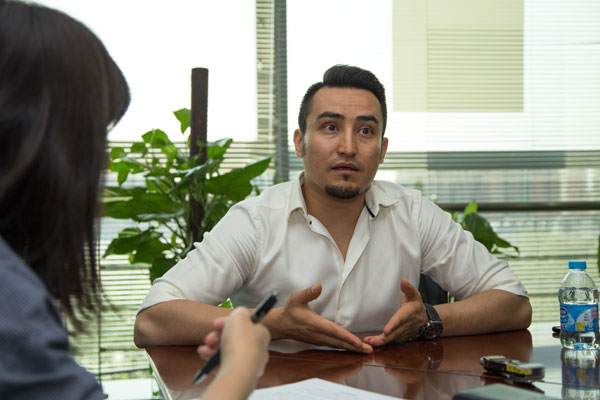Photographer shows the real Xinjiang to the world
- By Li Jingrong
 0 Comment(s)
0 Comment(s) Print
Print E-mail China.org.cn, May 28, 2015
E-mail China.org.cn, May 28, 2015
In a recent interview with China.org.cn, Uygur photographer Kurbanjan Samat talked of how he hopes he can present a true image of Xinjiang and its people to the world through "I Am from Xinjiang," a recently published album of his photographs.
 |
|
Uygur photographer Kurbanjan Samat is receiving an interview with China.org.cn. [Photo by Chen Boyuan/China.org.cn] |
Born in September 1982, Samat now works for the China Central Television Documentary Channel. He started working on his Xinjiang project in December 2013, documenting the everyday lives of people from northwestern China's Xinjiang Uygur Autonomous Region.
Samat travelled to more than 20 cities to take photos of over 100 Uygur people. An album of the photos was first published in Chinese in October 2014, and an English version is being released at the ongoing BookExpo America in New York on May 28.
Ending prejudice through communication
Samat hopes that people from different ethnic groups in China can communicate with each other to resolve misunderstandings. "A series of terrorist events [in Xinjiang] in the past year has created misunderstandings, prejudice, and even extreme views about its people," Samat said.
"As a Uygur, this distresses me. The people of Xinjiang I encounter work hard and are dedicated to the development of the country. Everybody is proud to be Chinese and is working and living positively."
Samat said 30 of the stories in the book were first published in the New York Times in March 2013. Their publication had an immediate impact in Chinese circles in the United States.
"Most Chinese living overseas still had the impression that the lives of the people of Xinjiang had been at a standstill since the end of the 1980s, when their common occupation was operating mutton barbeques on the street," said Samat.
"They didn't know that great changes had taken place in Xinjiang until they read my book,” he explained. “They came to know that many people of Xinjiang now live and work in large cities like Beijing, Shanghai and Guangzhou, and many of them are artists, doctors, lawyers, entrepreneurs and even rocket scientists."
The people of Xinjiang simply want to live, survive and hopefully thrive, just like everybody else, Samat added.





